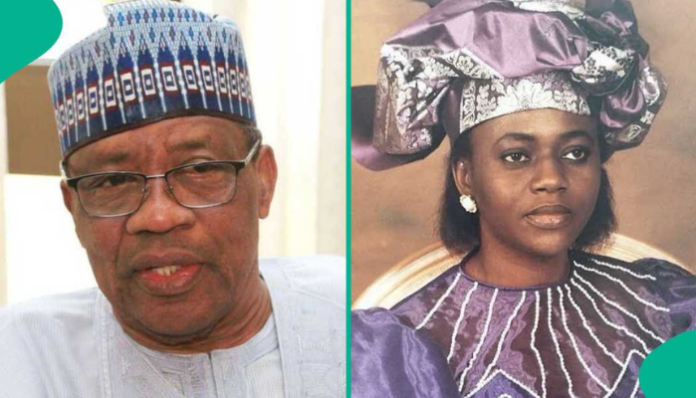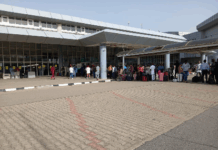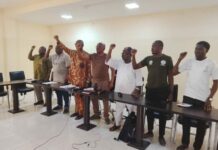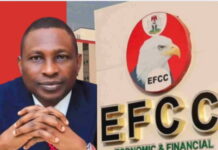“She was stunning; her ebony beauty set off enchanting eyes,” IBB narrates in his love story with his wife, Maryam
In his memoir, former Nigerian President Ibrahim Babangida (IBB) recalls the captivating love story with his wife, Maryam, a tale of persistence, skepticism, and ultimate devotion.
Despite early doubts from Maryam and those around them, IBB recounts how a combination of fate and determination led to their union, which has withstood the test of time.
“She was stunning. Her ebony beauty set off enchanting eyes, and her dazzling smile showed off a lovely set of teeth; when she smiled, and she often smiled, her face lit up, and her eyes danced.” IBB narrates his love story with his wife, Maryam.
In his book, IBB dedicates thirteen pages to recount his love story with his wife, Maryam. He said Maryam was highly skeptical of him as marrying material. She knew he had a track record of being something of a man about town but he was determined not to accept No for an answer.
He wrote: “I was close to Duba and first met Maria while we were both still at Provincial Secondary School in Bida. Duba’s aunt, his father’s sister, Asabe, was Maria’s mother, and it was in Garba’s house that I first met Maria Okogwu (as she then was). As young officers, we shared digs in the unmarried officer’s quarters by Kanta Road in Kaduna, and I was now seeing more of Maria.
She was stunning. Her ebony beauty set off enchanting eyes, and her dazzling smile showed off a lovely set of teeth; when she smiled, and she often smiled, her face lit up, and her eyes danced. Duba was as much a brother as a cousin to her, and, on the back of that, I often saw Maria at Duba’s house, and when she visited us at Kanta Road.

“In those days (I imagine it is not dissimilar today), the life of a young military officer was littered with short-lived liaisons. I was no exception and had my share of sowing my wild oats! The nature of army life, with its rigours and disposition to summary postings, meant that young officers often took their pleasures whenever the opportunity presented itself. I have often wondered whether the ever-present possibility of an early demise did not also account for our wandering eyes.

“Be that as it may, from the outset, I was very fond of Maria and she, eventually, of me. There was more than an element of predestination in our relationship. It was at NMTC that I began to notice Maria more.
“Duba’s father was fond of me, so I was mindful that my bonds with the family meant that I had to be more cautious than usual, a factor that synced with my natural shyness. She and I remained friends and maintained that friendship through my early years in the army, which included sojourns abroad for training in India and the United Kingdom.

“I left for the UK in April 1967 for what was meant to be a four- month course at the Driving & Maintenance RAC Centre, where l was trained to be an instructor in armed vehicle maintenance and driving. Given the political turmoil in the country at the time, I was not surprised when, in July, I was recalled home a fortnight before the conclusion of the course.
READ ALSO: IBB explains why Buhari was overthrown
By July 1967, the divergence in interpretation between the Federal Government and the Eastern Region on the outcome of the Aburi parley was hastening what increasingly seemed inevitable. When I left for the course in England, Nigeria was trying to resolve a crisis of identity. By the time I returned, the nation was at war with itself.
“Upon my return, I was immediately posted to the war front and saw action in several arenas. In April 1969, during our advance towards Umuahia, I was shot, and a piece of shrapnel was lodged in the right side of my chest. I was fortunate to be speedily evacuated to the Lagos University Teaching Hospital (LUTH), Idi-Araba, in Lagos. While convalescing in the hospital, I had plenty of time to reflect on my good fortune in not dying and what manner of future lay ahead of me. Being the only surviving male child of my parents, I was greatly troubled by the thought that had I died, that would have been the end of my family name and line.
“This was the first time I recall seriously thinking it was time to find a wife as a life partner. I was 28, and it seemed to me that it was time to settle down. While I was in the hospital, the Head of State and Commander-in-Chief of the Armed Forces, General Yakubu Gowon, had gotten married to his lovely wife, Victoria, with much pomp and military pageantry.
I cannot deny that their marriage and the accompanying ceremony further focused my mind on getting married myself. Lying in my hospital bed, I had lots of time to run through the various relationships I had had and try to decide which of them would best stand the test of time.
“Time and again, Maria Okogwu kept popping into my mind with her ageless beauty and enchanting smile.
Her father, Leonard Nwanonye Okogwu, hailed from Asaba in modern-day Delta State and worked in the Survey department of the Northern Nigeria Ministry of Lands and Survey. His job was an itinerant one, taking him to Kaduna, Zonkwa, Kafanchan and Kontagora. During these travels, he met and married Maria’s mother, Hajiya Asabe Halima Mohammed, from Kontagora in modern-day Kaduna State. When her father returned to Asaba after retirement, she and her siblings stayed with their mother, who lived with her brother, Alhaji Muhammadu King (Duba’s father), in Unguwan Sarki, Kaduna.
“Maria had attended Queen Amina College and then the Federal Training Centre, both in Kaduna. During the crisis in the north, just before the Nigerian Civil War, given the dangers associated with being from the Southeast, Maria’s uncle adopted his sister’s children, and they took his surname, placing them under his protective purview. That explains why the surname on our marriage certificate was King rather than Okogwu.
READ ALSO: My late wife converted to Islam after I promised not to take multiple wives ; IBB
“I had settled on Maria as the woman I would wed before being discharged from the hospital, and as soon as I was discharged, I made my way to Kaduna, where she lived with her mother and uncle. I was anxious to share the good news with her: I had decided we were destined for a life together. I admired her greatly for her reserved nature and the fact that she was well brought up. I wanted to make my intentions known to her and was determined not to accept No for an answer. Fortune favours the bold, and it smiled upon me; I counted and still count myself lucky.
“Initially, Maria was highly sceptical of me as marrying material. She knew that I had a track record of being something of a man about town, and those were not the qualities she wanted in a husband.
She was unconvinced of my capacity to be serious, and many people said as much to her. Her family had no objections as I was well known to them, so I had to use all the help I could muster, including Garba Duba’s father (Maria’s uncle), to solidify my proposal. He gladly lent his voice to my cause.
“Once I convinced her that I was serious, the prospect of becoming Mrs Babangida was not that difficult for Maria to contemplate. I shared with her the fact that my faith was an integral and essential part of my life and that I would require her to convert to Islam.
Praise be to Allah; this was not a difficult decision for Maria. Being part- Christian and part-Muslim at birth and already living in a Muslim household, it was never going to be wholly uncharted territory for her. She adapted with relative ease to married life as a Muslim.
“In proposing to Maria, I assured her that, though a Muslim, I did not intend to take multiple wives and bring up children from different women. I knew full well that my chances of a stable family life would be significantly improved if I avoided polygamy. I witnessed a close up, both among professional colleagues and in my extended family, the headaches and heartaches this led to, and that was not the life I wanted to live or to share with her. I wanted a life partner that would be by my side through thick and thin. I could not have made a better choice. She exceeded all the hopes and expectations of my youth at every stage of our life together.
“After securing the promise of her hand in marriage, I returned to the war front for a short while. While there, I was promoted to a Brigade Major. Soon afterwards, I returned to Kaduna where, shortly before her 21st birthday and after my 28th, Maryam (as she had by then become preparatory to our getting married) and I got married on September 6, 1969, at the marriage registry in Kaduna. As she had by this time converted to Islam, the marriage registry was followed by Islamic marital rites.
“It was not only Maryam who had early doubts about my ability to keep my marriage vows; my close friends (other than Kere Ahmed), especially those I had spent lots of time running around with, were far from convinced.
When I told one of them that I would no longer be one of their crew, he replied that I would soon return to my old ways! I told him that I wasn’t returning to my old ways because I had promised to remain faithful and bear true allegiance to the institution of marriage!! Thanks be to Allah, I kept that promise.”
Follow the Neptune Prime channel on WhatsApp:
Do you have breaking news, interview request, opinion, suggestion, or want your event covered? Email us at neptuneprime2233@gmail.com





